
As media coverage of the apparent suicides of 17 young people in Bridgend is put under the spotlight, the Department of Health has published a timely guide for journalists on reporting mental health and suicide.
Contributors to the guide include Sunday Express editor Martin Townsend, whose father was a manic depressive. He explains: ‘Mental illness has always been feared and its sufferers shunned and politely avoided. This is where the media must play its role.
‘Mental illness must be discussed, debated – brought out in the open – with sensitivity, understanding and, above all, love.”
The golden rule when reporting suicide, as set out by the Editors’ Code of Conduct, is to avoid excessive detail about the cause of death to avoid encouraging copycat attempts.
The guide cites three examples of how the reporting of suicide may have led to actual deaths when this rule has been ignored.
For obvious reasons, Press Gazette will not go into details of the cases in question. But the booklet mentions newspaper reports of an unusual suicide method involving a readily available household toxin – which were followed by nine cases involving that same method the following month.
The booklet also details how newspaper reports of an unusual suicide method involving a barbecue in Hong Kong were followed by what was believed to be the first use of this method in the UK.
The guide also advises journalists to include a phone number for Samaritans – 08457 909090 – wherever possible in reports about suicide. And it advises that the term ‘commit suicide’is inaccurate because suicide was decriminalised in 1961.
The guide urges journalists to avoid using terms such as ‘psycho”, ‘schizo’and ‘nutter”, arguing that they perpetuate stereotypical associations with violence.
Martin Rukin, who has schizophrenia, explains in the guide: ‘When I read about a ‘paranoid schizophrenic’ going ‘psycho’ in the papers, I just want to hide.”
The booklet also suggests ‘people with mental health problems’and ‘mental health patients’as preferable terms to ‘the mentally ill”. And it says ‘a person with’is better than ‘a person suffering from”.
It urges journalists to call residents of secure psychiatric hospitals patients (rather than inmates) and to avoid using the word schizophrenic to describe someone with a split personality, as this is an incorrect use of the term.
Former Guardian Readers’ editor Ian Mayes, also a contributor, says: ‘We stand in relation to some aspects of mental health – particularly in the way we refer to mental illness, in the language that we use and misuse – roughly where we stood in relation to race 20 or 30 years ago.
‘The least we can do is accept that language used about mental illness is important and reflect this in the practice of our trade.”
Downloadable copies of the guide are available at www.shift.org.uk/mediahandbook and by calling 020 7902 1972
Email pged@pressgazette.co.uk to point out mistakes, provide story tips or send in a letter for publication on our "Letters Page" blog
